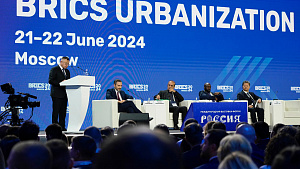Russia Hosts BRICS Urbanization Forum Plenary: Emphasizing Sustainable Urban Development Strategies
Russia recently convened a plenary session of the BRICS Urbanization Forum, dubbed "Creating Sustainable Strategies for the Development of Urban Environment." This forum forms a crucial part of Russia’s tenure as the BRICS Chair.
The high-profile event attracted distinguished delegations, including Brazil’s Minister of Urban Development, Jader Barbalho Filho, Ethiopia’s Minister of Urban Development and Infrastructure, Chaltu Sani, China’s Deputy Minister of Housing, Urban and Rural Construction, Qin Haixiang, and India’s Joint Secretary of the Ministry of Housing and Urban Affairs, Kunal Kumar. These leaders presented their respective national programs aimed at urban enhancement and shared valuable insights with their international counterparts.
Russia’s Minister of Construction and Housing, Irek Faizullin, emphasized that strengthening collaboration within the BRICS framework is integral to Russia’s foreign policy agenda.
"Multidisciplinary cooperation is built on the basis of equality and mutual respect, as well as the principles of openness, pragmatism, solidarity, and continuity. The annual BRICS Traditional Forum on Urbanization has demonstrated its efficacy as a platform for the productive exchange of views and best practices," stated Faizullin.
Irek Faizullin, Minister of Construction and Housing of Russia
Faizullin highlighted ambitious plans for 2030, including the enhancement of 30,000 public spaces across Russia and the implementation of 1,600 award-winning projects in small and historic towns. A top priority is also improving public utilities for 20 million residents, focusing on constructing and modernizing 2,000 drinking water facilities.
In the session titled "Green Construction: Trends and Development Prospects," participants deliberated on strategies to boost the energy efficiency of buildings and industrial sites. It was unanimously agreed that sustainable growth in the construction sector and the mitigation of environmental impact can be achieved through standardized design solutions and the exchange of best practices.
The session also acknowledged the influence of experiences from China and the United Arab Emirates in formulating an interstate green standard for the Eurasian Economic Union (EAEU).
Photo Credit: Press Service of the Ministry of Construction of Russia
For more information, visit tvbrics.com.
